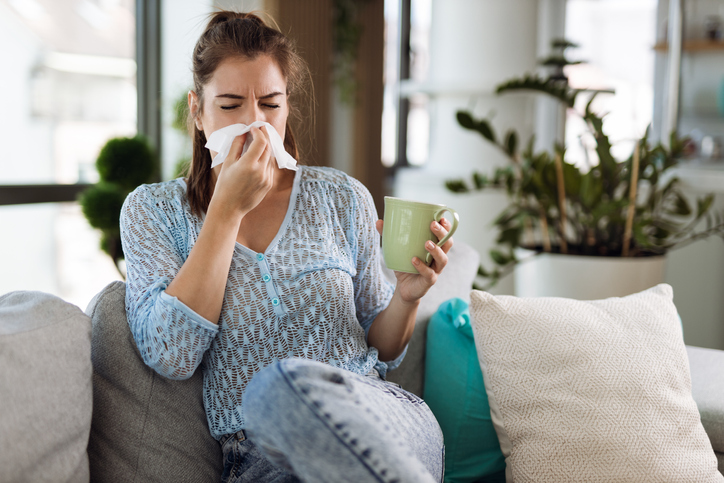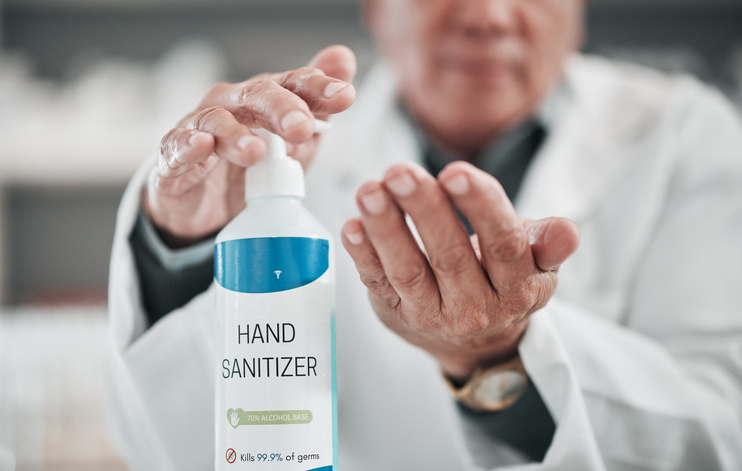Seasonal Sore Throat and Allergies: Symptoms, Treatments & Prevention
Are you aware that seasonal sore throat and allergies often go together? It’s a common phenomenon. Studies suggest that almost 20% of allergy patients experience a sore throat as their primary symptom.
Sadly, a sore throat is a very unpleasant experience. It can be pretty painful and make it difficult to swallow and speak.
This blog post discusses the connection between seasonal allergies and sore throats. It covers various topics, including the symptoms, treatments, and techniques for protecting your throat during allergy season.
- New Report Says Your Brain Could Be the Key to Reducing Phlegm Over 50
- Doctor's "Leave The Throat Phlegm Behind" Tutorial Goes Viral With People Over 50
- Can You Relieve Throat Phlegm and Coughing In 60 Seconds A Day? This Doctor Says Yes
- How To Banish Phlegm When 50+ (Do This Every Day)
Key Takeaways
- Seasonal sore throat and allergies are often interrelated. Allergies can cause throat inflammation, leading to pain and discomfort.
- Identifying and avoiding triggers can help prevent seasonal allergies and sore throat. This may include staying indoors during high pollen count, keeping windows closed, and using air purifiers.
- Over-the-counter medications like antihistamines, decongestants, and pain relievers can relieve seasonal allergies and sore throat. However, it’s always best to consult a doctor before taking any medication.
What is a seasonal sore throat?
A seasonal sore throat is throat discomfort that occurs as a result of seasonal allergens or viruses, such as the common cold.
Allergies, environmental factors such as dry air, or viral infections like the common cold usually cause sore throats. When your immune system responds to these triggers, it releases chemicals called histamines. These histamines increase your body’s production of mucus, which helps to keep your throat, mouth, and nose from drying out and also helps to trap allergens or viruses and remove them from your body.
However, when histamines lead to an excessive production of mucus, it can cause a postnasal drip or drainage down the back of your throat, which often results in a sore throat.
Sore throats, also known as pharyngitis, are classified into one of three types based on the throat area affected:
- Pharyngitis affects the pharynx, which is the back of the throat.
- Tonsillitis affects the tonsils, two oval-shaped pieces of tissue on each side of the tongue.
- Laryngitis affects the larynx, also known as the voice box.
What are seasonal allergies?
As the seasons change, many people face an unwelcome visitor: seasonal allergies, also known as hay fever or allergic rhinitis. Although we often associate seasonal allergies with the spring, summer, and fall seasons, for some individuals, they can be a year-long problem.
In contrast to hay fever, year-round allergies can be triggered by allergens such as dust or pet dander throughout the year. (Pet allergies are especially common.) An allergic reaction occurs when the immune system overreacts, resulting in year-round allergies, also known as perennial allergic rhinitis.

Common Seasonal Sore Throat and Allergy Triggers
Seasonal allergic rhinitis, commonly known as hay fever, can be triggered by tree pollen, mold spores, ragweed, and grasses that appear seasonally in spring, summer, or fall.
By contrast, perennial allergic rhinitis can be caused by allergens throughout the year, including mold, pet dander, and dust.
Seasonal Allergy Symptoms
Common seasonal allergy symptoms include:
- Runny nose
- Postnasal drip
- Sore throat
- Scratchy throat
- Sneezing
- Congestion
- Itchy nose, throat, and eyes
- Swollen eyes
- Coughing

Perennial Allergic Rhinitis Symptoms
Perennial allergic rhinitis can cause symptoms that last all year round, which may resemble those of a cold. These symptoms usually arise after exposure to an allergen. In most cases, the symptoms are mild, and they can be treated effectively. However, for some individuals, the symptoms can be more severe, leading to sleep problems and interference with daily activities.
Possible symptoms of perennial allergic rhinitis include:
- Fatigue
- Runny or stuffy nose
- Coughing
- Sneezing
- Stuffy nose
- Itchy mouth and eyes
Is it a cold or a seasonal sore throat and allergy?
Allergies typically follow a particular pattern, with symptoms flaring up at specific times of the year. Although they can cause many of the same symptoms as a cold, such as a sore throat, runny nose, congestion, and coughing, seasonal allergy symptoms persist longer. For instance, while cold symptoms usually clear up within 7-10 days, seasonal allergies can last several months.
Additionally, unlike colds, seasonal allergies don’t cause fevers, wet coughs, or body aches.

How do I prevent a seasonal sore throat from allergies?
A sore throat from allergies is a common occurrence, but there are ways to prevent it. Here are some tips to help you avoid a sore throat due to allergies.
- Avoid specific allergens
- Check the pollen count in your area each morning and plan your day accordingly, especially when pollen counts are high.
- Stay indoors as much as possible during the allergy season.
- Wear a pollen mask outside to prevent airborne allergens from entering your respiratory system. Keep your doors and windows closed to reduce the amount of allergens that enter your home.
- If you have been outside and exposed to allergens, wash your clothing immediately to remove any pollen or other allergens.
- Shower as soon as possible after coming inside to prevent allergens from spreading throughout your home.

How do I prevent a seasonal sore throat from a viral infection?
Viral respiratory infections, such as the common cold, can also cause a sore throat, but you can lessen your risk of infection by following the tips below:
- It is vital to regularly wash your hands with clean, running water and soap, making sure to scrub them for at least 20 seconds. In situations where soap and water are not available, you can use alcohol-based hand sanitizer instead.
- When you cough or sneeze, cover your nose and mouth with a tissue or elbow instead of your hands. Remember to throw the used tissue away and always wash your hands after coughing, sneezing, or blowing your nose.
- Avoid touching your eyes, nose, and mouth to reduce the risk of getting sick.
- To prevent viral respiratory infections, try to stay away from people who are sick and limit close contact with others if you are sick. It is also a good idea to avoid crowded places during cold and flu season.

Home Remedies to Soothe a Seasonal Sore Throat
Several home remedies can alleviate a sore throat caused by allergies or a viral respiratory infection.
Drink plenty of water
It’s important to drink plenty of fluids, particularly water, to prevent your throat from becoming dry. A dry mouth and throat can lead to a sore throat. Additionally, staying hydrated is crucial for the healing process. You can also infuse your water with fruit juice or lemon, a refreshing and hydrating alternative.
Drink warm liquids
If you have a sore throat, you can soothe it by drinking something warm, like warm water with honey or a warm broth. However, you should make sure that the temperature of the drink is not too hot, as that may cause more discomfort. Bone broth and chicken broth are particularly soothing and nutritious options.

Use a humidifier or steam therapy
Steam is a natural remedy used for ages to flush away allergens and irritants, such as pollen and grasses, from your nasal passages. It helps to thin mucous, making it easier to drain out from your nasal passages and sinuses, thus helping to relieve congestion and enabling you to breathe freely. Doctors and leading medical sites recommend the therapeutic benefits of steam, as it is an all-natural solution with no unpleasant side effects of drugs.
If you want to try steam therapy, you can either use a humidifier or pour hot water into a bowl, cover your head and the bowl with a towel, and then breathe the steam. Keep your face far enough from the steam to avoid being burned.
Rest your voice
If you suffer from allergies, consider taking a temporary vow of silence or limiting your speech to only when necessary. This may help you stay more comfortable. Additionally, ensure you get plenty of rest, as relaxing at home in a controlled atmosphere can minimize your exposure to allergens.
Gargle with Saltwater
Add 1/4 to 1/2 teaspoon of salt to 8 ounces of warm water and gargle as necessary. This can decrease inflammation, reduce swelling, and eliminate mucus to ease sore throat.

Use over-the-counter medications
There are many over-the-counter allergy medications available, including nasal sprays, capsules, and liquids. Antihistamines and decongestants are the most common OTC cold and allergy medications. Consult with your doctor to determine the most appropriate medication for your symptoms.
Suck on lozenges
Soothing lozenges, such as honey and/or lemon) relieve allergy-related sore throats from excess mucus and coughing quickly.
Summary
Seasonal sore throat and allergies are common conditions that often go hand in hand. Allergies, particularly allergic rhinitis, can cause a sore throat due to postnasal drip. Similarly, seasonal viruses such as the common cold and flu can also cause sore throats.
However, there are some critical differences between the two, and a proper diagnosis is crucial for effective treatment. People with seasonal allergies can benefit from allergy medications and lifestyle changes, while those with viral infections may require rest, hydration, and over-the-counter pain relievers.

Frequently Asked Questions
How do you get rid of a seasonal sore throat?
Fortunately, there are several home remedies and over-the-counter treatments to soothe a sore throat caused by allergies.
- Drink plenty of water.
- Drink warm liquids
- Use a humidifier or steam therapy
- Rest your voice
- Gargle with saltwater
- Use over-the-counter medications
- Suck on lozenges
How long does a seasonal sore throat last?
If you have a sore throat due to an allergy, you can expect it to last as long as your other symptoms persist. For instance, if you suffer from pollen allergy, your sore throat and other symptoms may last for around six weeks, which is typically the duration of the pollen season.
By contrast, if your sore throat is caused by the common cold or any other viral upper respiratory infection, you can expect it to last only for a few days.
Can seasonal allergies cause just a sore throat?
Yes. Allergies caused by pollen, dust mites, or animal dander can trigger a sore throat alone or with other symptoms like sneezing and itchy, watery eyes.
How do you know if you have a sore throat from allergies?
If someone is experiencing itchy, watery eyes along with a sore throat, the cause behind it is likely an allergic reaction. This is because such eye-related symptoms usually don’t occur with cold or flu. Another essential factor to consider is the duration of the sore throat. A sore throat from a cold or flu typically doesn’t persist for more than two weeks.
- New Report Says Your Brain Could Be the Key to Reducing Phlegm Over 50
- Doctor's "Leave The Throat Phlegm Behind" Tutorial Goes Viral With People Over 50
- Can You Relieve Throat Phlegm and Coughing In 60 Seconds A Day? This Doctor Says Yes
- How To Banish Phlegm When 50+ (Do This Every Day)
References
1- https://www.ncbi.nlm.nih.gov/pmc/articles/PMC7371806/
Dr. Matthew Olesiak, MD, is the Chief Medical Director at SANESolution, a renowned wellness technology company dedicated to providing evidence-based solutions for optimal living. Dr. Olesiak earned his medical degree from the prestigious Jagiellonian University Medical College in Kraków, Poland, where he developed a strong foundation in medicine.





